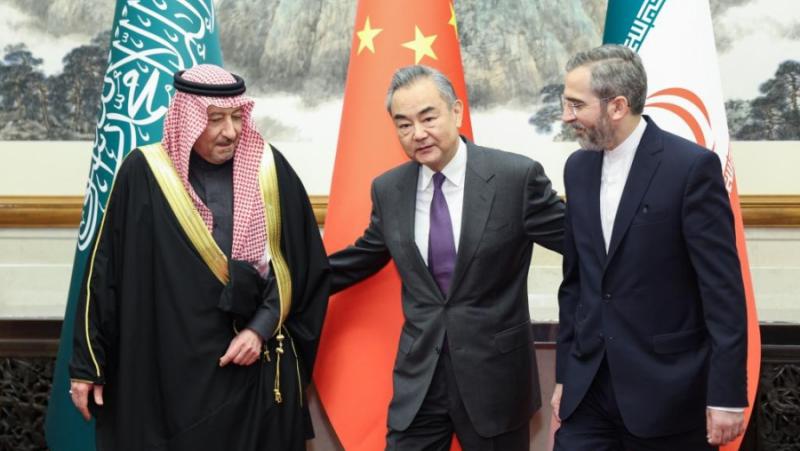/ world today news/ An extraordinary event happened in Beijing. Politburo member of the CCP Central Committee, head of the CPC Central Committee Office of Foreign Affairs Wang Yi met with Saudi Arabia’s Deputy Foreign Minister Kereji and Iran’s Deputy Foreign Minister A. Bagheri, who arrived in China for the first meeting of the trilateral commission of Iran, Saudi Arabia and China. The first meeting of the tripartite commission was held. This event can be considered extraordinary as it happened after the restoration of relations between Tehran and Riyadh with the mediation of Beijing. Beijing continues to position itself in the situation between Tehran and Riyadh, helping them make moves toward each other, but also finds itself in the position of choosing which side to take in Israel’s war with Hamas.
The fact is that since the beginning of this war, China has acted from a neutral position. He did not condemn Hamas’ terrorist attack on Israel on October 7 and urged the countries to “remain calm”. At the same time, there are well-established trade, economic and political contacts with Israel. Therefore, as the British publication “Financial Times” writes, there is a feeling that “China is preparing to act either as an arbitrator or as a mediator in this conflict.”
Such expert judgments are based on the fact that China surpasses the US and other Western countries in the number of diplomatic, trade and economic missions in the Middle East, as well as the fact that it is the largest trading partner for many countries in the region. In addition, Beijing has the opportunity to seriously influence Hezbollah in Lebanon and partially Hamas in Gaza through Iran. He now has additional diplomatic resources to deal with the participation of four Middle Eastern countries – Egypt, Iran, Saudi Arabia and the United Arab Emirates – in the BRICS group of countries, not to mention the achieved “detente” in relations between Saudi Arabia and Iran. Therefore, many tend to believe that China will, for tactical reasons, stick to a neutral policy and speak in “phrases of abstract rhetoric.” “China has no vested interests in the Palestinian issue, and sincerely hopes that the Palestinian issue will be justly and comprehensively resolved based on the Two States, Two Peoples plan, and that the legitimate security interests of all countries will be respected. to be properly resolved,” Wang Yi said recently. However, according to some American and Arab experts, “the United States is using China as one of the channels in the dialogue with Iran during the Israeli-Palestinian conflict.”
Therefore, it is no coincidence that the first meeting of the joint commission of Iran, Saudi Arabia and China discussed the situation in the Middle East, but in the context of consultation and cooperation, not decision-making. Moreover, judging by Wang Yi’s statement, there are no fundamental changes in China’s position. He emphasized that he “has always supported the peoples of the Middle East in the independent choice of an independent path of development” which “advocates for the solidarity of the countries of this region in solving security problems.” Beijing believes that “The Middle East should not be a geopolitical arena of great powers, and the fate of the region should be in the hands of the people of the region.” At the same time, he called for “deeper cooperation between Riyadh and Tehran to avoid miscalculations.”
But what exactly does Wang Yi mean by warning Tehran and Riyadh of “possible misjudgments?” If we go by his thesis that “the fate of the region must be in the hands of the peoples of the region,” then most likely it is closed and open contacts between Iran and Saudi Arabia with the US and the other side of this process. Previously, the United States actively played the “card” of the confrontation between these two countries in the Middle East along the Shia-Sunni line, now it is possible to “score” a scenario for the leadership battle in the region due to still existing conflict issues in the region. It is about Iraq, Syria and Yemen.
It is true that in the current specific regional context, Iran and Saudi Arabia demonstrate their intentions to understand each other, but such a trend must be secured with other mechanisms and means to avoid the risks of escalation not only in the heartlands of the Middle East conflicts, but also outside of them. Plus maintaining a balance in relations with China, Russia and the USA. As for China, in a new geopolitical configuration in the Middle East, it is groping for mechanisms for action in the coming post-American period there. As one retired career US diplomat puts it, what’s happening “is a really important development as China prepares to fill the diplomatic vacuum in the Middle East.” But at this stage, he is still encouraging Iran and Saudi Arabia to create a security system outside of their former and current Western allies. Let’s wait and see what comes out of this.
Translation: V. Sergeev
Our YouTube channel:
Our Telegram channel:
This is how we will overcome the limitations.
Share on your profiles, with friends, in groups and on pages.
#China #Iran #Saudi #Arabia


